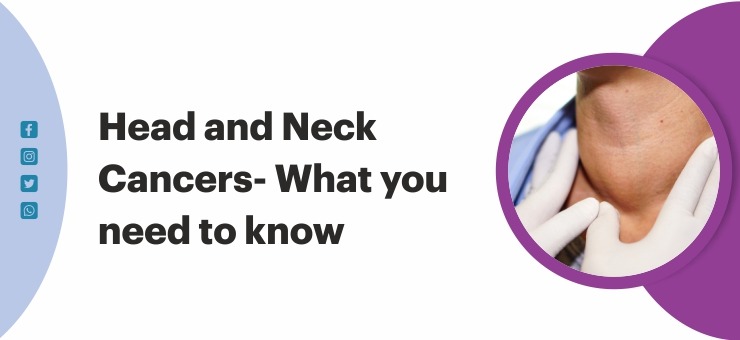Head and neck cancers are a group of cancers that affect the mouth, throat, larynx, nasal cavity, and salivary glands. These cancers can be quite aggressive and require specialized treatment. The most important factor that determines the outcome of the treatment is the time it is started. As with every cancer, early detection and treatment will give better results.
To detect head and neck cancers early, you will have to know the general symptoms you are likely to experience if you have them. This blog gives you the necessary vital information to help you identify take action early.
Types of head and neck cancersThere are several types of head and neck cancers and they are categorised depending on their location. They are
Oral cavity cancer that affects the lips, gums, tongue, and other areas within the mouth
Pharyngeal cancer that affects the throat, including the tonsils, the back of the tongue, and the soft palate
Laryngeal cancer that affects the voice box
Nasal cavity and paranasal sinus cancer that affects the nasal cavity, sinuses, and nasal passages
Salivary gland cancer that affects the glands responsible for producing saliva
Causes of head and neck cancersCancers may develop without a known cause, but in many cases, there are varied risk factors and causes that could lead to head and neck cancers. The common causes of head and neck cancers include:
Tobacco and alcohol use: Smoking and heavy alcohol consumption can damage the cells in the lining of the mouth and throat, which can lead to cancer.
Human papillomavirus (HPV): HPV is a common sexually transmitted infection that can cause certain types of head and neck cancers, particularly in the oropharynx (the back of the throat).
Sun exposure: Prolonged exposure to the sun can cause skin cancers on the face, head, and neck.
Occupational exposure: Certain jobs that involve exposure to chemicals, such as those found in the construction or manufacturing industries, can increase the risk of developing head and neck cancers.
Genetics: Some genetic mutations may also increase the risk of developing certain types of head and neck cancers.
Symptoms of head and neck cancersSymptoms depend on the type of cancer and its stage. Some of the general symptoms of head and neck cancers that you should watch out for include:
- A lump or swelling in the neck or mouth
- Pain or difficulty swallowing
- Persistent sore throat
- Changes in the voice
- Unexplained weight loss
- Ear pain or hearing loss
- Bleeding from the mouth or nose
- Numbness in the face or mouth
If you experience any of these symptoms, it's important to see a doctor for an evaluation at the earliest.
Treatment options for head and neck cancersTreatment options depend on the type, location and stage of the cancer. The comprehensive range of treatments for head and neck cancers includes:
Surgery: Depending on the location and stage of the cancer, the surgeon may remove a portion of the affected tissue or the entire affected area. In some cases, reconstructive surgery may be necessary.
Radiation therapy: High-energy radiation is used to destroy cancer cells and is often used in combination with surgery or chemotherapy.
Chemotherapy: Drugs are used to kill cancer cells, usually in combination with radiation therapy.
Immunotherapy: An emerging treatment option, it uses the body's immune system to fight cancer cells.
Targeted therapy: Uses drugs to target specific proteins or genes involved in the growth and spread of cancer cells.
At Zanish Cancer Hospital, we offer multimodal treatment options that combine various methods of cancer treatment. The treatment team will develop a personalized treatment plan based on each patient's specific condition to provide the best outcomes.
If you have any of the symptoms of head and neck cancers, don’t hesitate to contact our cancer specialists. We will work together to fight cancers and help you overcome them to live a productive life.






